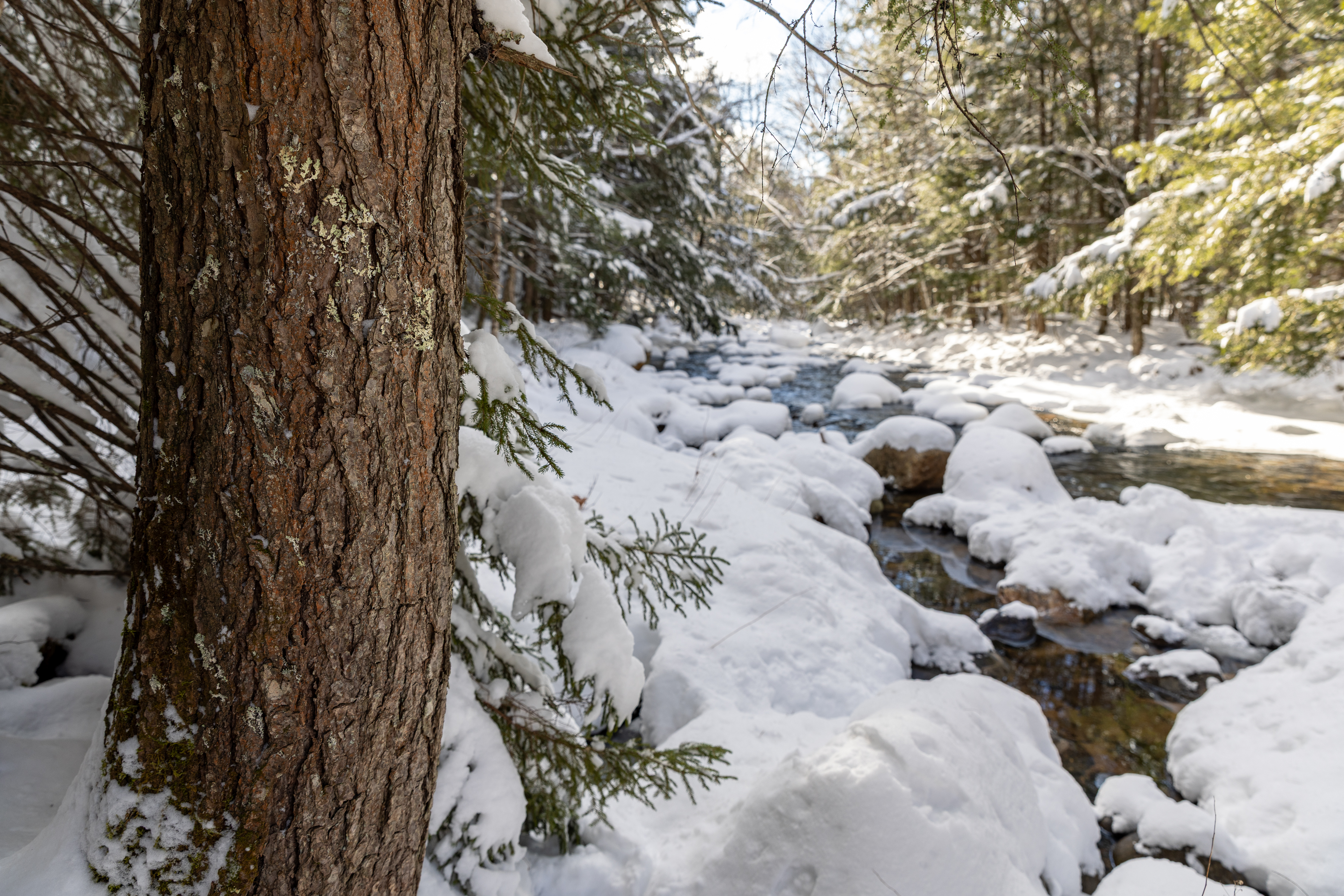State-run nursery opens sales in early December
- Tags:
- Volunteers,
- Forest Journal
A group of Seed Seekers in-training are enthralled by Billy Kunelius describing the process of gathering soft mast fruits, to the machinery that removes the seeds from the other plant materials - here he is demonstrating how you can just pluck a cluster of fruit. (Photo: Laurel Swope-Brush)
The New Hampshire State Forest Nursery has had several years of record-breaking sales since the peak of the pandemic as people turned to outdoor activities for stress relief. But, manager William “Billy” Kunelius realized that the organization was missing a key ingredient as the state-run nursery increased supply — help to collect the seed.
“More hands are always welcome,” Kunelius said. “It’s time consuming.”
He said the Forest Nursery, part of the Division of Forests and Lands in the State Department of Natural and Cultural Resources, aims to collect 95 percent of the seed they plant with only two full-time staff and a small crew of seasonal workers. Last year, the team collected 4,800 pounds of seed, offered 40 different bare-root seedling species for purchase, and sold out of everything in inventory.
A few years ago, Mary Tebo Davis, then an urban and community natural resources field specialist for the University of New Hampshire Cooperative Extension, suggested training volunteers to collect seed to make the process easier.
Kunelius thought it was a great idea and since then, more than 20 trained UNH Extension volunteers have contributed seed to the Forest Nursery. This fall, the “Seed Seekers” pilot project got an extra boost when a new group of volunteers stepped up.
The Society for the Protection of New Hampshire Forests’ Land Steward Program has trained and supported volunteers to help monitor and manage conservation land for more than 30 years. Land Steward & Volunteer Coordinator Laurel Swope-Brush said it was a natural fit to offer volunteer land stewards the opportunity to help the Forest Nursery as well.
“We targeted our volunteer land stewards for this particular project because they hold a lot of pride and connection to the forests that they steward,” Swope-Brush said. “They also have a good knowledge of the landscape where particular species of the priority trees are located on the property.”
Before adopting a forest to monitor, land stewards receive training in forest management, GPS/compass use, trail maintenance, community engagement, boundary monitoring, and recreation management. The volunteers — like the Forest Society properties — are spread out across the state.
“Having volunteers in other areas of the state really allows us hopefully to be able to expand the genetic diversity of the seedlings we offer,” Kunelius said.
The Forest Nursery, founded in 1910, grows the locally collected seed in seedbeds in Boscawen so the seedlings will be well adapted to the state’s climate and free of disease and insect pests.
Last year, New Hampshire’s Forest Nursery was one of 27 state, island territory, and commonwealth nurseries across the country to receive support through the Bipartisan Infrastructure Law to make improvements to the operation and efficiency of reforestation nurseries, according to the U.S. Forest Service.
Kunelius said backyard gardeners and farmers are increasingly interested in “planting for climate change” by growing trees that will sequester CO2 and selecting species that thrive in warmer climates. The Nursery’s seedlings are often used for wildlife food and cover; site reclamation; erosion control; reforestation; and Christmas tree growing stock, among many other uses.
However, adding a new species to the Forest Nursery’s offerings isn’t as simple as just planting a seed because there needs to be a reliable source for the species in the future, he said.
Kunelius led a training in August with 10 Forest Society volunteers, including Stephen Fox and his wife, Denise.
“We were interested in taking the training because it looked like a fun thing to do together and because we want to help maintain the genetic diversity and health of trees in the forests around us,” Stephen said in an interview by email. “Some things we learned at the Nursery included when it is the optimal time to look for tree seeds, how to recognize viable seeds, and how to care for them before drop off.”
The Foxes put their knowledge to work around Concord.
“We quickly learned that the red and white oaks in the properties we steward were not producing mast this year,” Stephen said, adding that they were able to find hardwood seed elsewhere to contribute to the Forest Nursery.
Since the training, Swope-Brush said Forest Society volunteers have delivered buckets, bags, and boxes of seeds that will help support the diversity and quality of the trees and shrubs raised at the nursery. The Forest Society’s volunteers can also help alert the nursery when seeds are dropping from certain species or where species like shagbark hickory or white oak are flourishing.
Thanks to volunteers like the Foxes, Kunelius said he expects that the Forest Nursery will add a new, “top secret” species to the inventory this year. The online store (buynhseedlings.com) opens in early December with inventory based on conservative estimates of fall seedling countsabout what will grow. Seedlings ordered over the winter are available for pickup or shipping after they are harvested from seedling beds in April and May. Then, inventory may be added as the seedlings are lifted from the seed beds in spring and then shipped to or picked up by customers from mid-April to late May.
Of the state-run nurseries across the country, Kunelius said the New Hampshire State Forest Nursery’s “Seed Seekers” program is unique.
“We’re pretty much the only ones that are using volunteers or have a volunteer-type program like this,” he said. “Hopefully people find it an interesting and rewarding volunteer opportunity.”
Anna Berry is the director of communications and digital outreach at the Forest Society. This article was originally published in the New Hampshire Union Leader on November 10, 2024.
